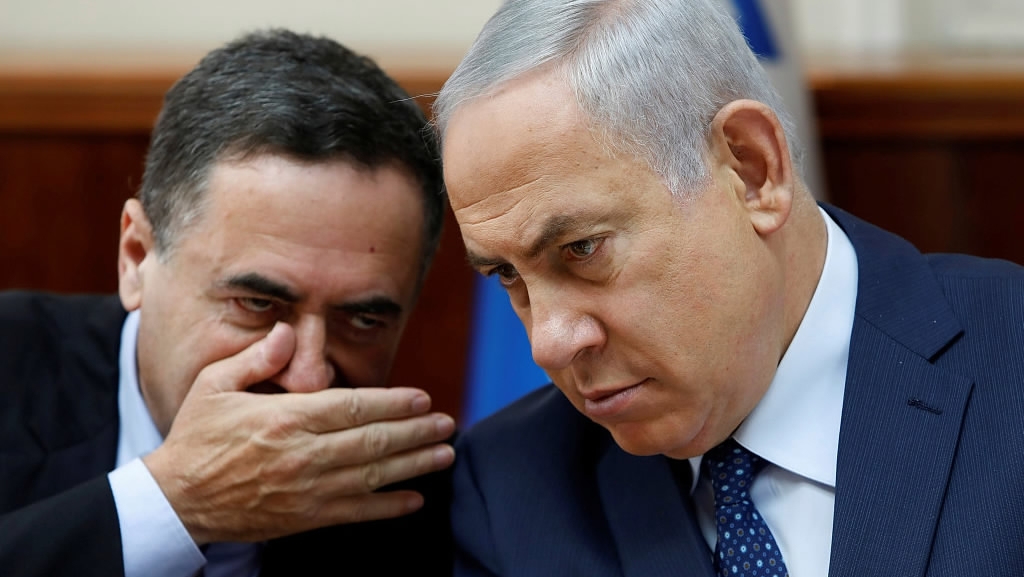Israel’s Minister of Intelligence has suggested that the Saudi Crown Prince Mohammed bin Salman visit the Jewish state. Israel Katz extended the invitation during an interview with Saudi media outlet Elaph, but for the readers of the Arabic-language online website, the proposal might as well have never been made.
Elaph published on Wednesday an interview with Katz that spanned a wide range of topics, from peace talks with Palestinians to prospects of war with Lebanon’s Hezbollah. He also expressed his wish for bin Salman to pay a visit to Israel, but it appears that the publication decided not to relay the message, and exclude any reference to such a remark.
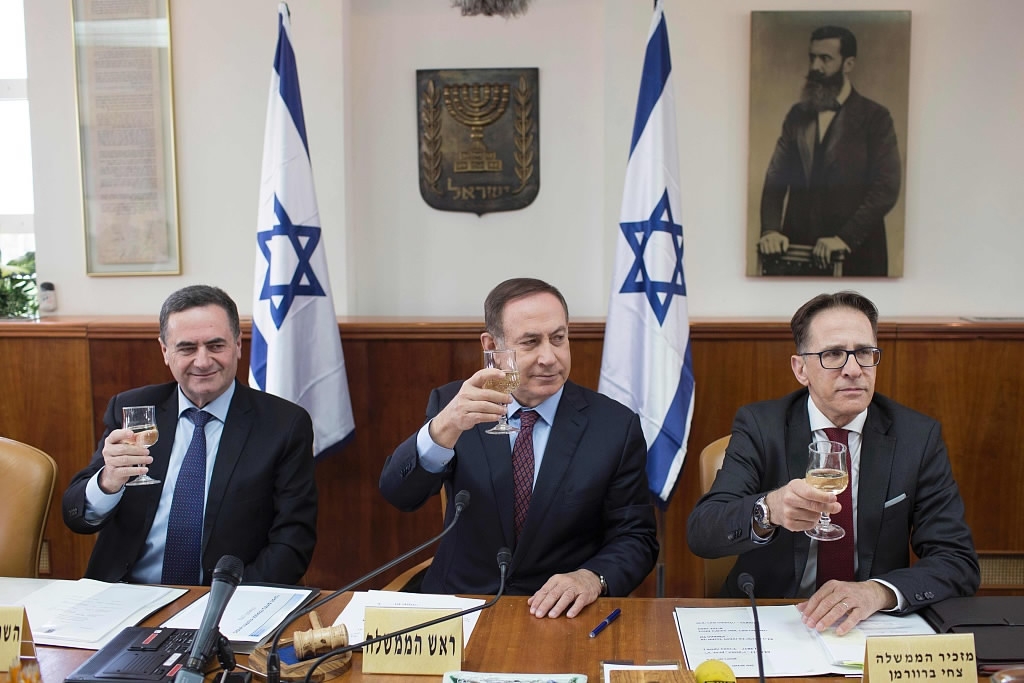
Israeli Prime Minister Benjamin Netanyahu (C), Minister of Transportation Israel Katz (L) and Cabinet Secretary Tzahi Braverman (R) raise a toast to mark the Passover holiday at the Prime Minister's office in Jerusalem on April 9, 2017. /VCG Photo
Israeli Prime Minister Benjamin Netanyahu (C), Minister of Transportation Israel Katz (L) and Cabinet Secretary Tzahi Braverman (R) raise a toast to mark the Passover holiday at the Prime Minister's office in Jerusalem on April 9, 2017. /VCG Photo
The missing quote
"I call on [Saudi] King Salman to invite [Prime Minister Benjamin] Netanyahu for a visit, and for the Crown Prince [Mohammed bin Salman] to come for a visit here in Israel," Katz, who is also Israel’s Minister of Transportation, was cited as saying during the interview, however not by his interviewer.
The invitation made rounds in Israeli media, which received a copy of the Q&A transcript through the minister’s office, with some outlets like Haarezt including the surprising offer in their lede. But Elaf seems to have opted to leave the quote out.
The London-based news website is owned by Saudi businessman Othman Al Omeir, who is known for its close ties to King Salman.
The omission of the Israeli official's visit proposal to the Saudi royal is a pointer to how the slightest hint at the possibility of normalization between Israel and Saudi Arabia remains a highly sensitive matter for Riyadh – especially at a time the Arab world is seething with anger over US President Donald Trump’s recognition of Jerusalem as the capital of Israel.
Saudi Arabia and Israel have no official diplomatic ties, but a recent slew of reports suggested a
covert rapprochement between the two sides.
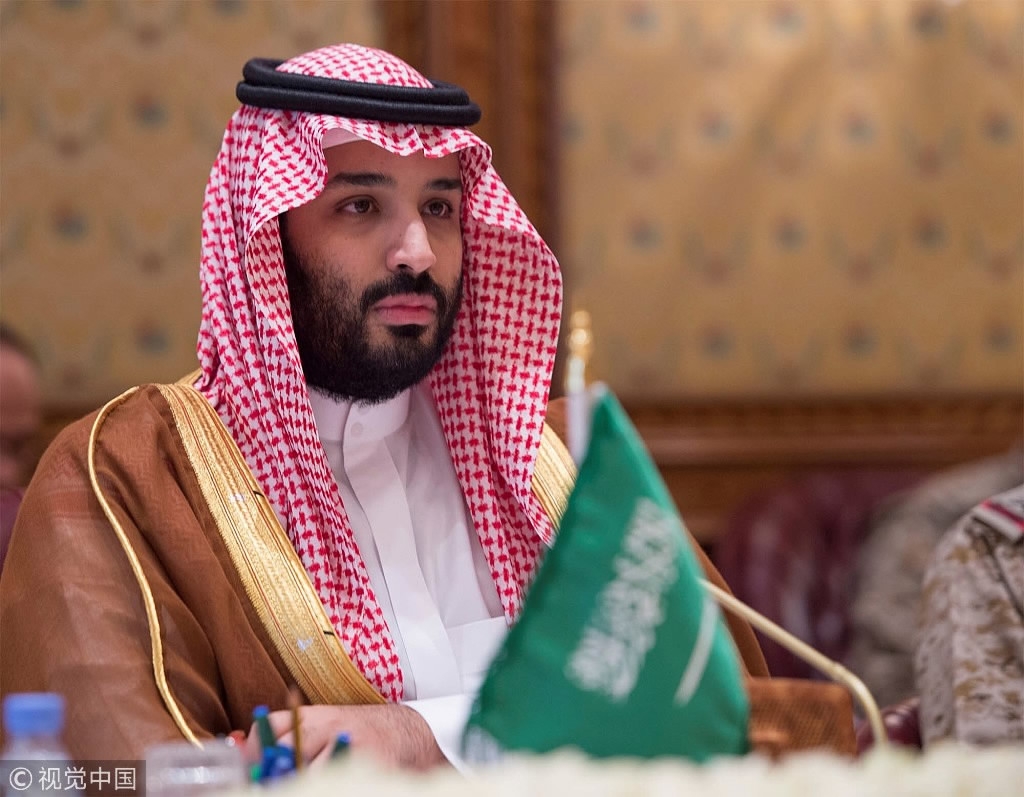
Saudi Crown prince Mohammad bin Salman meets United States Secretary of Defense, James Mattis (not seen) in Riyadh, Saudi Arabia on April 19, 2017. /VCG Photo
Saudi Crown prince Mohammad bin Salman meets United States Secretary of Defense, James Mattis (not seen) in Riyadh, Saudi Arabia on April 19, 2017. /VCG Photo
The two countries are joined by their animosity to Iran, and share the common goal of curbing Tehran’s expanding influence in the region. In the interview with Elaph, Katz did not pass the opportunity to reiterate such accord, maintaining that Israel and Saudi Arabia agree "on everything" regarding the Iranian issue.
Omitted by not erased
The exclusion of the quote did not go unnoticed, with Israeli media pointing out the discrepancy.
"Katz confirmed to Haaretz that he extended the invitation in an interview to the Saudi online newspaper Elaph, however, the online publication chose to edit the invitation out," wrote Noa Landau in an article on Haaretz's English website.
According to online news website Al-Masdar News (AMN), Elaph sent the office of the Israeli minister a copy of the interview, which included Katz’s invitation to the Saudi Crown Prince.
"We approved it and circulated a message to the Israeli media about the interview, highlighting the minister's invitation to the Saudi side. But we saw that the website (Elaph) decided to publish a different headline and delete the invitation sent by the minister to the Crown Prince," AMN quoted Katz’s officer as saying.
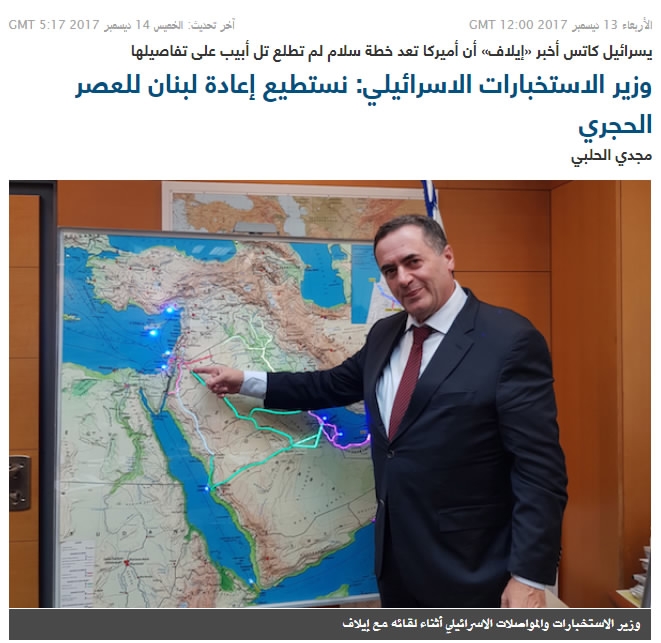
Screenshot of Elaf's published article.
Screenshot of Elaf's published article.
It was not immediately clear whether the decision to exclude Katz’s offer preceded the article’s publication, or came as an afterthought.
The article was published at 1200 GMT on Wednesday, and was last updated at 0517 GMT on Thursday.
A never before offer
The direct invite is the first of its kind extended by an Israeli official to a Saudi counterpart by name, and an extension of a softened rhetoric about some Arab states which Israel has adopted in recent months.
Officials in Israel have been vocal about behind-closed-doors cooperation with some Arab authorities, without naming any.
In September, Netanyahu said ties with some Arab countries have achieved a "breakthrough", noting that cooperation exists "in various ways and [at] different levels" between his country and Arab states.
Should bin Salman accept the invitation, as unlikely as it is to happen, it would be the first time a high-level Saudi official visits Israel, at least in an announced trip.
A few months back,
speculations swarmed around the Crown Prince after an Israeli journalist suggested bin Salman secretly visited Israel, unleashing a torrent of media attention that eventually prompted the Saudi foreign ministry to issue a statement refuting the claims.
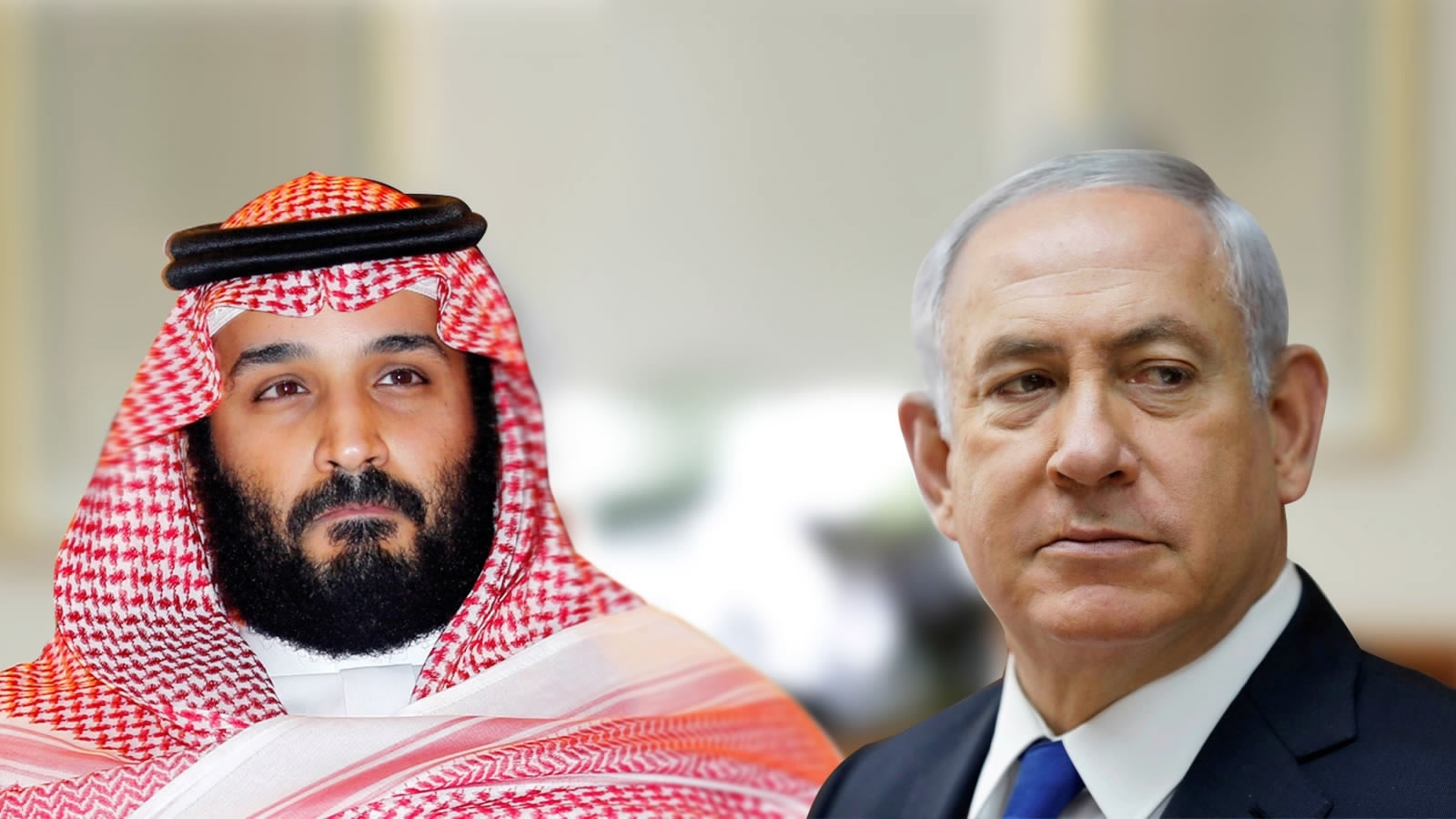
A collage of Saudi Crown Prince Mohammad bin Salman (L) and Israeli Prime Minister Benjamin Netanyahu (R).
A collage of Saudi Crown Prince Mohammad bin Salman (L) and Israeli Prime Minister Benjamin Netanyahu (R).
Giving US peace plan legitimacy
Katz extended the invitation to the Saudi royal when answering Elaph’s answers about the future of a peace deal with Palestinians.
The Israeli official said the US is working out a new initiative, without "telling us what it includes". He expressed his belief that it is "an opportunity" and called on the Saudis to take part in it.
Trump's son-in-law and presidential adviser Jared Kushner and US Middle East envoy Jason Greenblatt are said to be laying out the foundations for a new US-sponsored peace framework.
The last round of US-brokered peace talks between Palestinians and Israelis collapsed in 2014 amid acrimony.
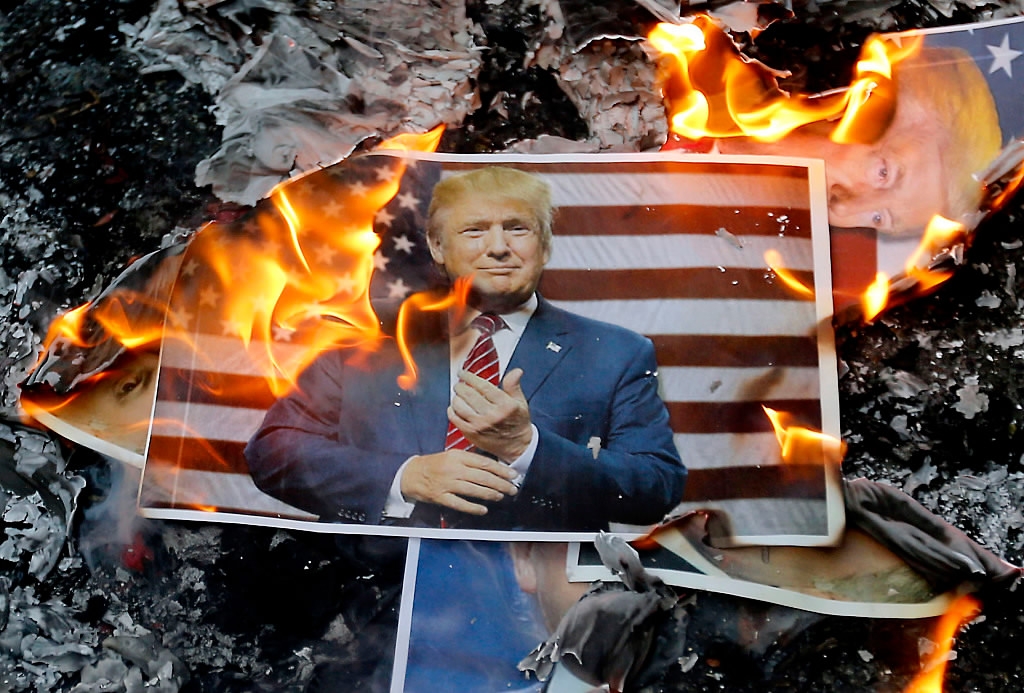
A portrait of US President Donald Trump burns during a demonstration in Tehran on December 11, 2017 to denounce his declaration of Jerusalem as Israel's capital. /VCG Photo
A portrait of US President Donald Trump burns during a demonstration in Tehran on December 11, 2017 to denounce his declaration of Jerusalem as Israel's capital. /VCG Photo
"I recommend that Saudi Arabia, as the leader of the Arab world, take the initiative upon itself and come to the Palestinians and offer its sponsorship".
"They [the Palestinians] are too weak, they need someone to help them," he maintained.
Israel’s call for Saudi to partake in the efforts to end the chronic stalemate with Palestinians comes at a time the role of the US in any future peace initiatives has been thrown into uncertainty. Last week, Trump recognized Jerusalem as the capital of Israel and announced plans to relocate the country’s embassy from its current location in Tel Aviv, at the risk of diluting Washington’s influence in possible peace negotiations.
Riyadh’s patronage of a prospective US plan could help market it with the Palestinian leadership, who has already vetoed Washington’s possible mediation in talks with the Israelis.
Trump’s decision sparked public outrage and prompted widespread criticism from Arab and Muslim countries, the European Union and United Nations among others.
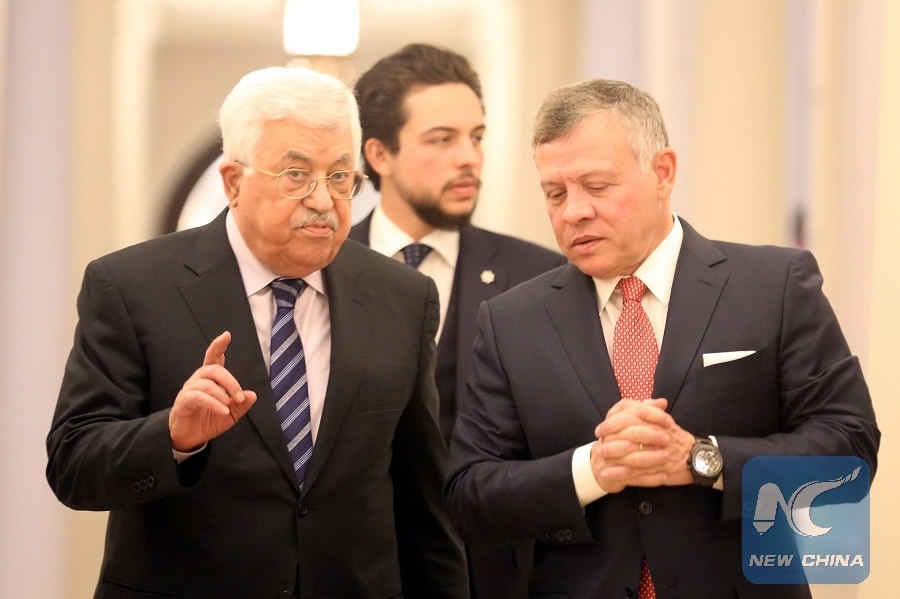
King Abdullah II of Jordan (R) meets with Palestinian President Mahmoud Abbas (L) in Amman, Jordan, on December 7, 2017. /Xinhua Photo
King Abdullah II of Jordan (R) meets with Palestinian President Mahmoud Abbas (L) in Amman, Jordan, on December 7, 2017. /Xinhua Photo
On Wednesday, Palestinian President Mahmoud Abbas said the US was no longer "fit" for mediating between Palestinians and Israelis.
"We do not accept any role of the United States in the political process from now on, because it is completely biased towards Israel," he said during an emergency summit of the Organization of Islamic Cooperation (OIC) in Istanbul.
The meeting’s closing statement declared "East Jerusalem as the capital of the state of Palestine" and urged "all countries to recognize the state of Palestine and East Jerusalem as its occupied capital".
The same call was made by King Salman from Saudi Arabia on the same day, although some have questioned whether Riyadh was merely paying lip service.
Reports emerged last week claiming Riyadh has been trying to convince Palestinians to settle for
Abu Dis, a suburban village outside East Jerusalem, as the capital of their future state.

